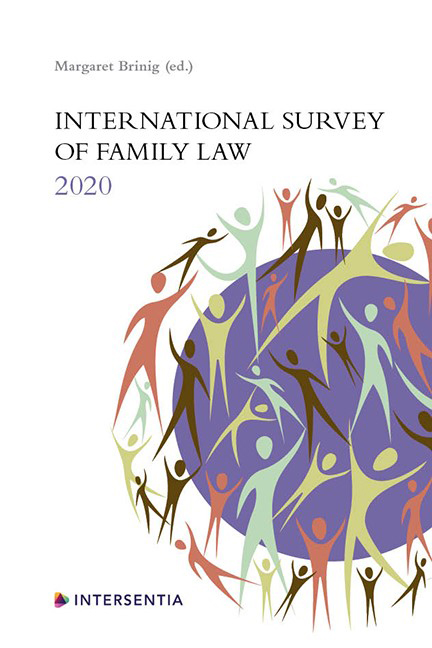Book contents
- Frontmatter
- Preface
- Contents
- List of Contributors
- Australia: The Search for Property in the Labyrinth of the Discretionary Trust
- Brazil: Intuitu Personae Adoption in the Brazilian Legal System
- Canada: Family Law at the Supreme Court of Canada
- China: Reform of the Marriage and Family Part of the Civil Code in China
- England and Wales: Beware of International Relationships
- European Court of Human Rights: Challenging Paternity under Case Law of the European Court of Human Rights
- France: A Chronicle of French Family Law: 2019
- Germany: Gender Identity, Sexual Orientation and Parentage: Family Law Lagging Behind
- Hong Kong: Hong Kong Family Law Today: Drowning not Waving?
- Korea: Full Guardianship in Korean Law: An Evaluation Over Seven Years from the Perspective of Family Court Practices and the Constitution
- Norway: The New Norwegian Adoption Act
- Poland: Discussion and Reform of Family Law in Poland
- Scotland: Making Scotland ‘The Best Place in the World to Grow Up’?
- Serbia: Child Maintenance and Welfare in Serbian Law
- Slovenia: New Regulation on Guardianship for Adults in Slovenia
- South Africa: Aspects of Dutch Colonial Family Law Related to the Indonesian Rajah of Tambora’s Exile at the Cape
- Sweden and California: On Children’s Rights to be Heard in Custody and Support Matters
- UN Committee on the Rights of the Child: Continued Reflections on Family Law Issues in the Jurisprudence of the CRC Committee: The Convention on the Rights of the Child @ 30
- Index
Germany: Gender Identity, Sexual Orientation and Parentage: Family Law Lagging Behind
Published online by Cambridge University Press: 09 February 2021
- Frontmatter
- Preface
- Contents
- List of Contributors
- Australia: The Search for Property in the Labyrinth of the Discretionary Trust
- Brazil: Intuitu Personae Adoption in the Brazilian Legal System
- Canada: Family Law at the Supreme Court of Canada
- China: Reform of the Marriage and Family Part of the Civil Code in China
- England and Wales: Beware of International Relationships
- European Court of Human Rights: Challenging Paternity under Case Law of the European Court of Human Rights
- France: A Chronicle of French Family Law: 2019
- Germany: Gender Identity, Sexual Orientation and Parentage: Family Law Lagging Behind
- Hong Kong: Hong Kong Family Law Today: Drowning not Waving?
- Korea: Full Guardianship in Korean Law: An Evaluation Over Seven Years from the Perspective of Family Court Practices and the Constitution
- Norway: The New Norwegian Adoption Act
- Poland: Discussion and Reform of Family Law in Poland
- Scotland: Making Scotland ‘The Best Place in the World to Grow Up’?
- Serbia: Child Maintenance and Welfare in Serbian Law
- Slovenia: New Regulation on Guardianship for Adults in Slovenia
- South Africa: Aspects of Dutch Colonial Family Law Related to the Indonesian Rajah of Tambora’s Exile at the Cape
- Sweden and California: On Children’s Rights to be Heard in Custody and Support Matters
- UN Committee on the Rights of the Child: Continued Reflections on Family Law Issues in the Jurisprudence of the CRC Committee: The Convention on the Rights of the Child @ 30
- Index
Summary
Résumé
Après d’abondantes réformes législatives en 2017 et 2018, les plus récents développements du droit familial allemand sont largement le fait des tribunaux. Une fois de plus, les hautes instances judiciaires agissent comme des acteurs de changement, particulièrement en présence de situations de fait pour lesquelles aucun encadrement légal n’est prévu. C’est le cas pour l’identité de genre, les parents de même sexe, la gestation pour autrui et les beaux-parents de facto. Même si certaines réformes ont vu le jour à l’égard de ces situations, il reste que de nombreux changements sociétaux fondamentaux et de transformations de la vie familiale font encore l’objet de débats et ne jouissent d’aucune reconnaissance légale.
INTRODUCTION
Following an abundance of legal reforms in 2017 and 2018, more recent developments in German family law have largely been prompted by court involvement. Once again, the highest German courts are acting as drivers for reform, particularly in instances where the law does not offer a legal framework for a number of de facto situations. This is true in relation to gender identity (Section 2), same-sex parentage (Section 3) and surrogate motherhood (Section 4) as well as for de facto step-parents (Section 5). While some legal reforms have arisen through these cases, many of the fundamental societal changes and transformations of family life are still being discussed and still lack legal recognition.
GENDER IDENTITY: OPTIONS FOR TRANSSEXUAL AND INTERSEXUAL PEOPLE
Following a landmark decision by the German Federal Constitutional Court in 2017, the German Personal Status Act (Personenstandsgesetz (PStG)) was changed, and a third legal category of gender – ‘diverse’ – was introduced. Mandatory birth registration still includes a section to define the child's gender, but it now offers the additional category of ‘diverse’ in addition to ‘female’ and ‘male’. There is also the possibility of not stating the child's gender in cases of gender variabilities, German Personal Status Act, section 22 paragraph 3. The pre-existing possibility of simply leaving this section blank if the child’s gender could not be determined as female or male was rejected by the Federal Constitutional Court as insufficient to express the person's gender identity.
- Type
- Chapter
- Information
- International Survey of Family Law 20202020 Edition, pp. 135 - 148Publisher: IntersentiaPrint publication year: 2020



